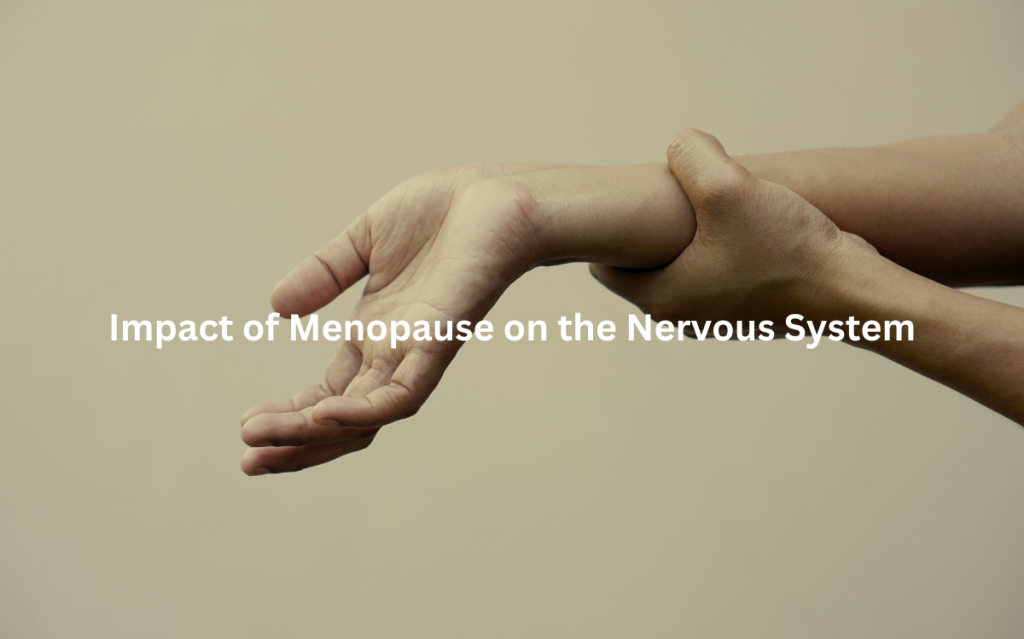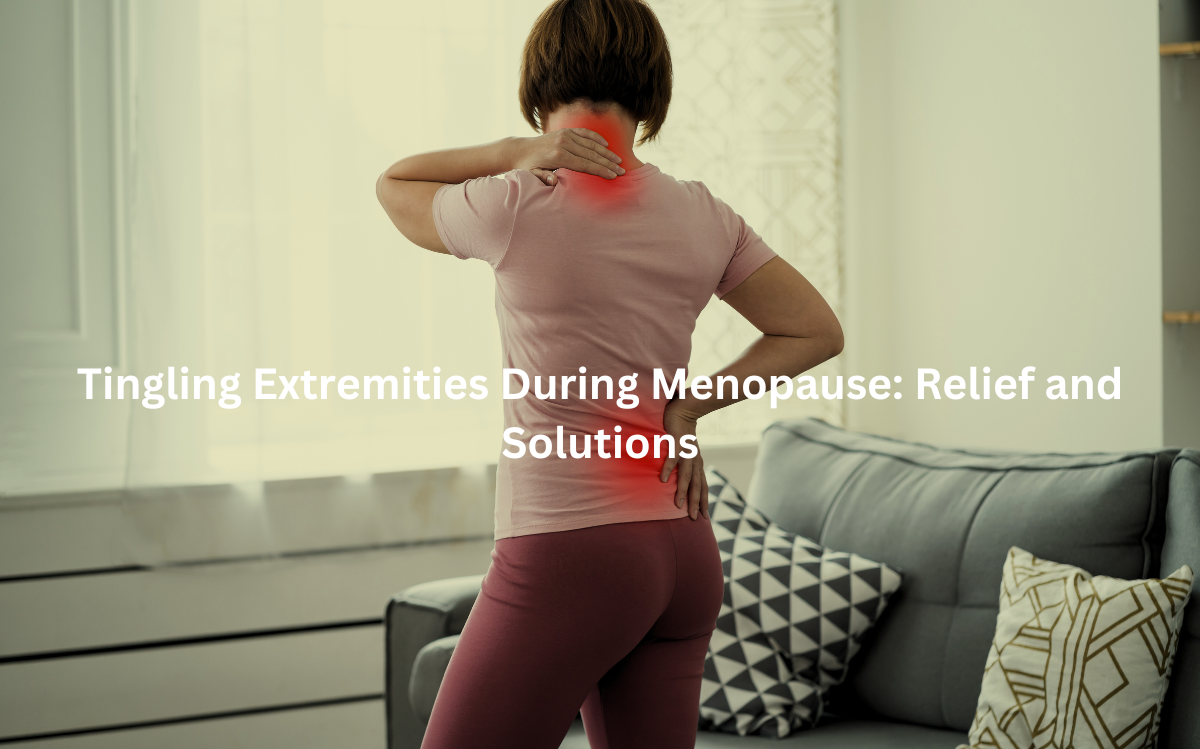Understand the causes of tingling extremities during menopause and how to manage this common symptom.
Tingling extremities, or sensations like pins and needles, are a common yet often overlooked symptom of menopause. This issue typically stems from hormonal changes, particularly the decline in estrogen levels, which can affect the nervous system. (1)
While it can be uncomfortable, there are effective ways to alleviate this sensation and manage menopause symptoms overall.
Key Takeaways
- Hormonal fluctuations during menopause can cause nerve-related symptoms, including tingling in the extremities.
- Vitamin B12 supplementation can help address nerve health and reduce tingling sensations.
- HRT and non-hormonal treatments offer different solutions for managing menopausal nerve pain and discomfort.
Tingling Extremities during Menopause: Causes and Symptoms
Tingling sensations, often described as “pins and needles” or a burning feeling, can be a real nuisance during menopause. These sensations typically occur in the hands, feet, or legs. So, what causes this uncomfortable feeling?
Causes of Tingling Sensations:
- Estrogen Decline: As estrogen levels drop during menopause, nerve sensitivity increases. With less estrogen, the nerves in extremities may misfire, causing prickling or burning sensations.
- Peripheral Neuropathy: This condition involves damaged nerves that transmit signals from the brain to the rest of the body, leading to tingling sensations.
- Central Nervous System Changes: Estrogen impacts neurotransmitter function in the brain. When estrogen declines, it can disrupt nerve signal transmission, resulting in abnormal sensations.
If you’re experiencing persistent tingling, track the symptoms and consult with a healthcare provider to understand the underlying cause, especially if it’s affecting your daily life.
Vitamin B12 and Nerve Health in Menopause
Vitamin B12 is essential for nerve health, and it’s something that can easily be overlooked, especially during menopause. B12 helps in the production of red blood cells and maintains the health of the nervous system. During menopause, some women may experience B12 deficiency due to diet, decreased absorption, or other health conditions. This deficiency can worsen symptoms like tingling and nerve pain.
The symptoms of B12 deficiency can overlap with those of menopause, making it harder to identify. Tingling, numbness, and a general sense of fatigue can all result from not getting enough B12. In severe cases, nerve damage can become permanent.
It’s recommended that women going through menopause get their B12 levels checked. A simple blood test can help determine if a deficiency is contributing to the symptoms.
If the levels are low, B12 supplementation could help reduce tingling sensations and promote nerve health. In some cases, a healthcare provider may recommend B12 injections if oral supplements aren’t enough to restore adequate levels.
Hormonal Therapy (HRT) for Menopausal Symptom Management
Hormone Replacement Therapy (HRT) has been a common treatment for menopause-related symptoms, replenishing hormones like estrogen and progesterone that decline during menopause. For many women, it offers significant relief from extreme discomfort.
Benefits of HRT for Menopause Symptoms:
- Hot Flashes and Night Sweats: HRT is highly effective for reducing these symptoms.
- Mood Swings: It can help regulate mood fluctuations.
- Nerve Sensitivity: Estrogen has a neuroprotective effect, and replacing it may alleviate tingling and burning sensations.
However, HRT isn’t suitable for everyone. Some risks include:
- Increased Risk of Blood Clots
- Breast Cancer
- Stroke
The risks depend on factors like age, type of HRT, and duration of use. For women with certain health conditions, such as a history of breast cancer, HRT may not be an option.
Before considering HRT, it’s important to consult a healthcare provider to assess the benefits, risks, and tailor the treatment to individual needs and symptoms.
Non-Hormonal Treatments for Managing Tingling Extremities
Not every woman can or wants to use HRT to manage their menopausal symptoms. For those women, there are non-hormonal treatments available. (2)
One such option is gabapentin, a medication that is commonly used to treat nerve pain and neuropathy. Gabapentin can be effective in reducing the tingling and burning sensations caused by nerve damage or irritation.
Antidepressants, particularly selective serotonin reuptake inhibitors (SSRIs) and serotonin-norepinephrine reuptake inhibitors (SNRIs), are also sometimes prescribed for menopausal women who experience nerve discomfort. These medications can help alleviate symptoms like tingling by modulating the brain’s response to nerve signals.
In addition to medication, lifestyle changes can play a significant role in managing nerve-related symptoms.
Regular exercise, especially stretching and strength training, helps maintain nerve and muscle health. A balanced diet rich in essential nutrients, including vitamin B12, omega-3 fatty acids, and magnesium, can also help reduce nerve sensitivity and discomfort.
Incorporating relaxation techniques like yoga or mindfulness meditation can help reduce stress, which can, in turn, lower the intensity of menopausal symptoms, including nerve pain.
Impact of Menopause on the Nervous System

Estrogen isn’t just important for reproductive health; it also plays a crucial role in the function of the central nervous system (CNS). When estrogen levels drop during menopause, the brain and nerves can experience changes. One effect is an increase in nerve sensitivity, leading to those annoying tingling and burning sensations in the extremities.
Estrogen receptors are found throughout the nervous system, including the brain. The hormone helps regulate neurotransmitters like serotonin, which impacts mood and nerve signal transmission. When estrogen levels dip, the body may react with a variety of symptoms, including altered skin sensations, mood swings, and even problems with memory.
The effects on the nervous system during menopause are still being studied, but researchers have found that maintaining overall nerve health is vital. Staying active, managing stress, and maintaining a healthy diet rich in brain-boosting nutrients can help mitigate the effects of reduced estrogen.
Lifestyle Changes to Manage Menopause Symptoms
Menopause isn’t just a hormonal shift; it’s also a time for lifestyle changes. Managing symptoms like tingling extremities involves adjustments that support nerve and overall health. Here are some key strategies:
Nutritional Support:
- Vitamin D, Calcium, and Magnesium: These nutrients are crucial for nerve function and bone health, reducing the risk of osteoporosis.
- Food Sources: Leafy greens, fatty fish, eggs, and fortified cereals can help provide these essential vitamins and minerals.
Exercise:
Regular exercise, including strength training and aerobic activities, helps improve circulation, boost nerve health, and reduce tingling sensations. It also combats fatigue and mood swings, common during menopause.
Stress Management:
Managing stress is vital to alleviate symptoms. Techniques like deep breathing, yoga, or daily walks can help calm nerves and reduce menopausal discomfort.
Weight Management:
Maintaining a healthy weight reduces strain on nerves and joints, improving overall health during menopause. A balanced diet and regular activity can help keep weight in check, further easing symptoms.
When to Consult a Healthcare Provider for Menopause Symptoms
While menopause symptoms are common, there are certain signs that might suggest it’s time to consult a healthcare provider.
If tingling sensations become persistent, painful, or interfere with daily activities, it’s important to seek professional care. Similarly, if other symptoms, like mood swings or hot flashes, become unbearable, discussing treatment options with a doctor can provide relief.
Women should also consult a healthcare provider if they experience sudden or severe nerve pain that doesn’t seem to be connected to menopause. Conditions like diabetes, carpal tunnel syndrome, or peripheral neuropathy might cause similar symptoms and require different treatments.
For women who feel overwhelmed by menopausal symptoms, specialized menopause centres or healthcare providers can help. They can provide advice on managing symptoms, recommend tests, and discuss various treatment options, whether hormonal or non-hormonal, based on individual needs.
Conclusion
Managing tingling extremities during menopause involves understanding the role of hormonal changes and nerve health. Vitamin B12 deficiency can worsen symptoms, while treatments like HRT, gabapentin, and SSRIs provide relief.
Lifestyle changes, including proper nutrition, exercise, and stress management, are essential for maintaining nerve health.
A personalized approach from healthcare providers is key to effectively addressing symptoms and improving quality of life. With the right support, most women can find relief and regain comfort.
If tingling extremities are affecting your daily routine, book a personalised consultation with Modern Menopause today and start finding relief: Book your consultation.
FAQ
What causes tingling extremities during menopause?
Tingling in the hands or feet is a common menopause symptom caused by declining estrogen levels. As women experience the menopause transition, their nerve function can become disrupted. This often leads to numbness, tingling, or a burning sensation in the extremities.
Symptoms like these may also be linked to changes in blood flow and nerve cells. Women report feeling these sensations more in parts of the body like their hands or feet. If tingling persists, it’s a good idea to consult a doctor, as there could be other underlying medical conditions involved.
Can menopause cause restless legs syndrome and tingling?
Yes, menopause can cause restless legs syndrome along with tingling extremities. As oestrogen levels start to decline during menopause, women experience changes in nerve function, which can trigger sensations like numbness and tingling, especially in the hands or feet. These sensations may also involve electric shock-like feelings or burning sensations.
Restless legs syndrome is also a common symptom during this time of life, often disrupting sleep. If symptoms like these are affecting your quality of life, it may be helpful to consult a doctor for proper diagnosis and treatment options.
How can hormone therapy help relieve tingling during menopause?
Hormone therapy is one of the most effective ways to help relieve tingling during menopause by restoring oestrogen levels, which can improve nerve function. When oestrogen levels start to decline, women may experience sensations like numbness and tingling, particularly in their hands or feet.
Hormone therapy can help regulate these bodily functions and reduce discomfort, including burning sensations and restless legs. If you’re experiencing menopause tingling, consider consulting a doctor to discuss whether hormone therapy might be right for you.
What are some natural ways to help relieve tingling in extremities during menopause?
To help relieve tingling in the hands or feet during menopause, try improving blood flow and nerve function with regular exercise. Activities like walking or strength training can boost circulation and reduce sensations like burning or numbness.
Additionally, managing stress through deep breathing or yoga can calm nerves and improve sleep quality. Staying hydrated and maintaining a balanced diet with vitamins like magnesium and calcium can also support overall nerve health. If menopause tingling persists, it’s best to consult a doctor for further advice.
When should I consult a doctor about menopause tingling?
If you are experiencing tingling in your hands or feet that doesn’t subside or worsens, it’s important to consult a doctor. Persistent menopause tingling could be a sign of nerve dysfunction or another medical condition, such as multiple sclerosis or poor blood flow.
A doctor can help evaluate the cause of your symptoms and suggest treatment options to help relieve discomfort. In many cases, consulting a healthcare provider will help you manage symptoms like numbness, tingling, or restless legs syndrome more effectively.
References
- https://www.menopausecentre.com.au/tingling-extremities/
- https://pmc.ncbi.nlm.nih.gov/articles/PMC6445536/

Leave a Reply